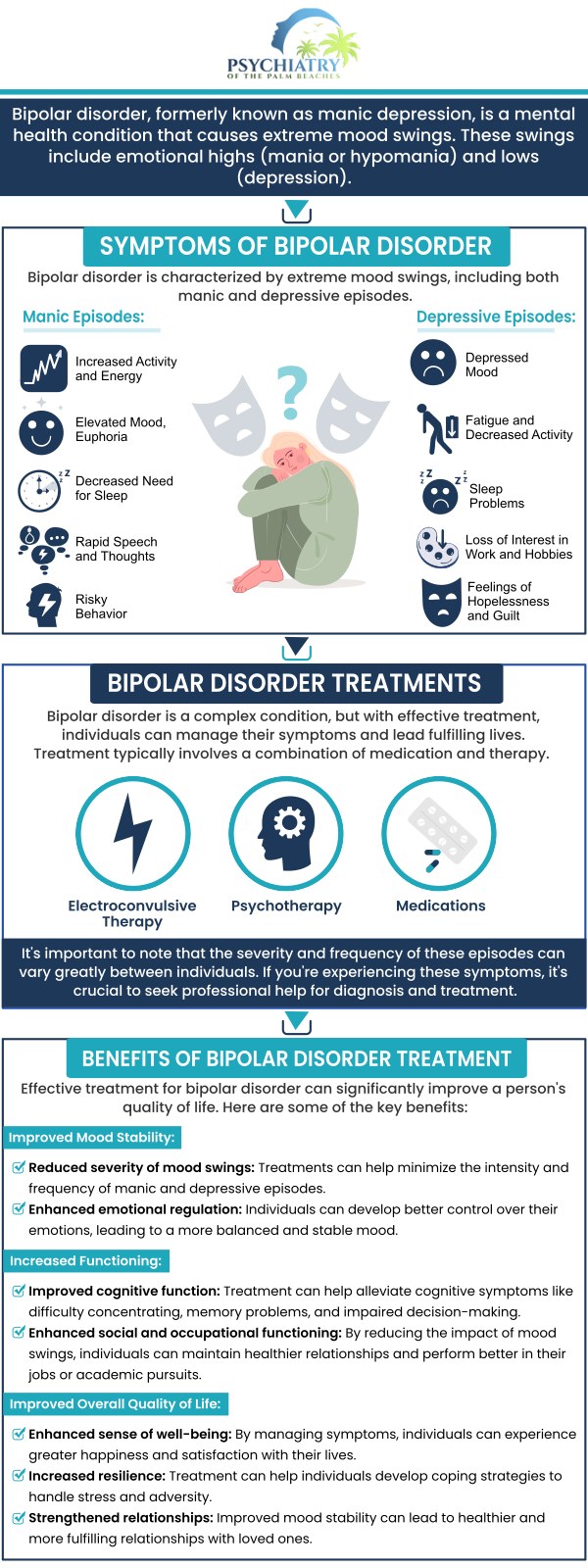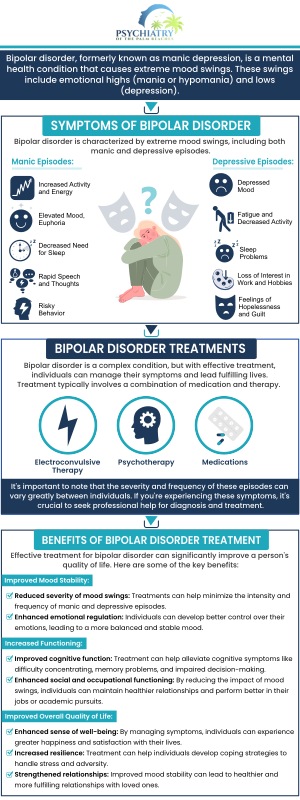The Impact of Bipolar Disorder on Relationships and Work
Bipolar disorder can significantly impact relationships, causing emotional instability and unpredictable behavior that may strain personal connections. In the workplace, mood swings and periods of depression or mania can affect productivity, reliability, and overall job performance, making it challenging to maintain consistent employment. For more information, contact us today or book an appointment online. Visit Psychiatry of the Palm Beaches serving Jacksonville, Boynton Beach, Palm Beach Gardens, Stuart, Royal Palm Beach, Port St. Lucie, Melbourne, Fort Lauderdale, and Jupiter, FL.




Table of Contents:
How does bipolar disorder affect relationships?
How does bipolar disorder affect you at work?
How can partners support someone with bipolar disorder?
What strategies can maintain stability in relationships despite bipolar disorder?
Bipolar disorder is a complex mental health condition that significantly impacts various facets of an individual’s life, including their personal relationships and professional endeavors. At Psychiatry of the Palm Beaches, we understand that the fluctuating moods associated with bipolar disorder can strain interpersonal connections and create challenges in maintaining stable employment. Individuals diagnosed with this condition may experience episodes of mania and depression, which can lead to misunderstandings and emotional turmoil in relationships, as well as inconsistencies and productivity issues at work. By providing comprehensive, empathetic care and tailored treatment plans, we aim to support those affected by bipolar disorder in managing its effects and improving their overall quality of life.
Bipolar disorder can profoundly affect relationships due to the unpredictable and often intense mood swings that characterize the condition. During manic episodes, individuals may exhibit impulsive behaviors, heightened irritability, and grandiose thinking, which can lead to conflicts, misunderstandings, and even breaches of trust with loved ones. Conversely, depressive episodes may cause withdrawal, emotional unavailability, and persistent feelings of sadness or hopelessness, making it difficult for partners or family members to maintain a supportive and balanced relationship. The constant oscillation between these states can create an environment of instability and uncertainty, placing significant emotional strain on both the individual with bipolar disorder and their loved ones. Effective communication, patience, and a comprehensive treatment plan are essential for managing these challenges and fostering healthy, supportive relationships.
Bipolar disorder can significantly impact an individual’s performance and interactions within the workplace. Manic episodes may lead to impulsive decision-making, overconfidence, and an unrealistic assessment of one’s capabilities, which can result in taking on too many tasks or making risky choices that jeopardize job safety and project outcomes. This heightened activity is often followed by periods of depression, during which the individual may struggle with low energy, lack of motivation, and overwhelming feelings of hopelessness. These depressive episodes can lead to absenteeism, decreased productivity, and difficulties meeting deadlines. Furthermore, the fluctuation between mania and depression can disrupt an individual’s ability to maintain consistent work relationships, causing misunderstandings with colleagues or supervisors. The unpredictability of mood swings can make it challenging to commit to long-term projects or maintain a steady career trajectory, often resulting in additional stress and anxiety about job security. Therefore, managing bipolar disorder effectively through appropriate treatment and support is crucial for maintaining a stable and productive work life.
Supporting a partner with bipolar disorder requires a compassionate, informed, and proactive approach. Educating oneself about the complexities of bipolar disorder is the first key step; understanding the symptoms, triggers, and treatment options can help partners respond more effectively and empathetically. Open, non-judgmental communication is crucial – creating a safe space where your partner feels comfortable sharing their feelings and challenges can significantly alleviate their emotional burden. Partners should encourage adherence to treatment plans, including medication and therapy, without appearing intrusive or controlling.
Offering practical support, such as reminding them of appointments or helping them establish a routine, can also be beneficial. Recognizing signs of mania or depression early on and knowing how to respond appropriately – whether it’s providing space, offering comfort, or seeking professional help – is vital in managing episodes before they escalate. Lastly, partners should prioritize self-care and seek support for themselves, as caregiving can be demanding; maintaining one’s well-being ensures they can provide the necessary support while preserving the relationship’s health and stability.
Maintaining stability in relationships despite bipolar disorder involves adopting a series of strategies focused on communication, understanding, and proactive management. Consistent and open communication is essential; partners should regularly check in with each other and discuss their feelings, needs, and concerns. Establishing a structured routine can also bring a sense of predictability and security, helping to mitigate the impact of unexpected mood swings. Being informed about bipolar disorder and its effects can foster empathy and patience, enabling partners to respond supportively during high and low periods.
Additionally, setting boundaries and having a clear plan for managing crises – knowing what to do and who to call if symptoms intensify – is crucial. Engaging in couples therapy can provide a neutral space to work through challenges and develop coping strategies together. It’s also vital to ensure that both partners prioritize self-care so they can maintain their health and well-being. At Psychiatry of the Palm Beaches, we offer tailored support to help couples navigate these complexities. Don’t hesitate – contact us or book an appointment online to receive the guidance necessary for fostering a stable and nurturing relationship. We serve patients from Boynton Beach FL, Delray Beach FL, Palm Beach Gardens FL, Jupiter FL, Stuart FL, Palm City FL, Royal Palm Beach FL, Wellington FL, Citrus Ridge FL, Jacksonville FL, Riverside FL, Port St. Lucie FL, Beau Rivage West FL, Melbourne FL, Palm Bay FL, Jupiter FL, North Palm Beach FL, and surrounding areas.
Check Out Our 5 Star Reviews



Additional Services You May Need
▸ Mental Wellness
▸ Relationship Coaching
▸ Depression and Mood Disorders
▸ Women’s Health
▸ Panic Disorder
▸ Medications Management
▸ Men’s Health
▸ Individual Psychotherapy
▸ Bipolar
▸ ADHD
▸ Geriatric Mental Health
▸ Couple’s Counseling
▸ Obsessive Compulsive Disorder
▸ Social Phobia Treatment
▸ Eating Disorders
▸ Post Traumatic Stress Disorder
▸ Psychotic Disorders


